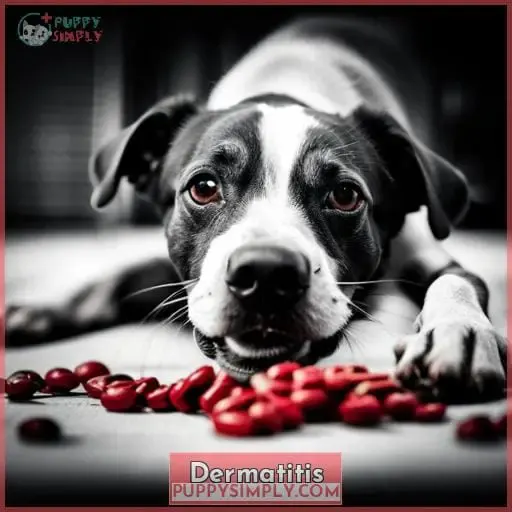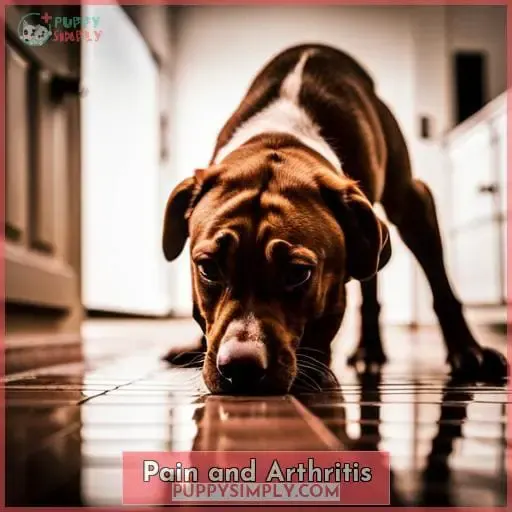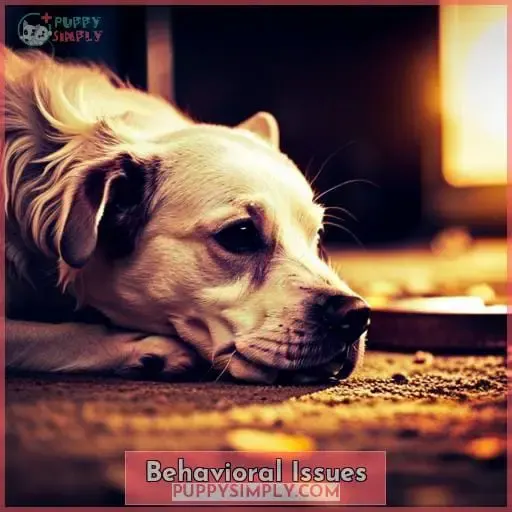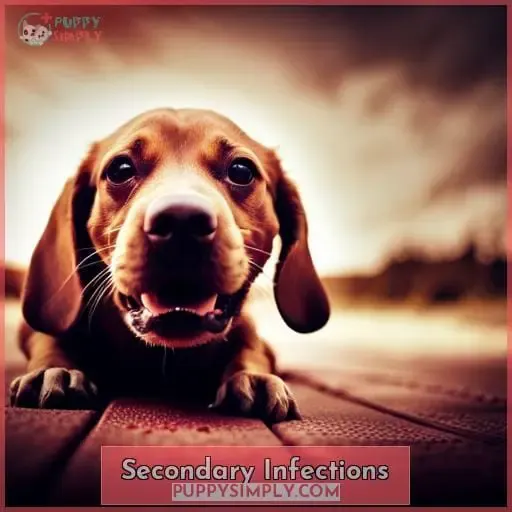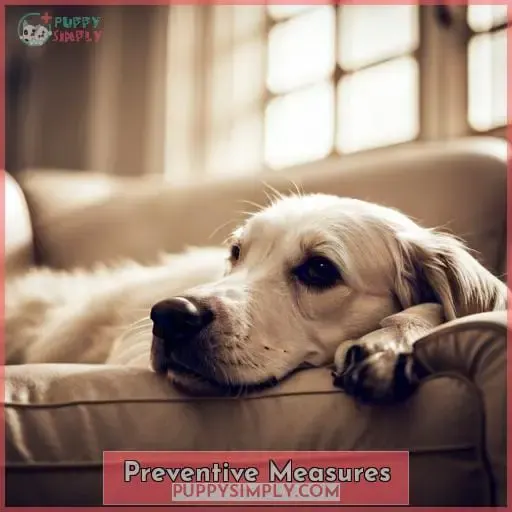This site is supported by our readers. We may earn a commission, at no cost to you, if you purchase through links.
 You’ve likely caught your pup licking their paws more than usual. While occasional licking is normal grooming behavior, excessive paw chewing could signal an underlying issue.
You’ve likely caught your pup licking their paws more than usual. While occasional licking is normal grooming behavior, excessive paw chewing could signal an underlying issue.
Culprits range from injuries, skin irritation, allergies, anxiety, or boredom. As pack leader, tuning into your doggo’s needs is key. By understanding potential causes for obsessive licking, you can help diagnose and treat the root problem – restoring happy paws in no time.
Table Of Contents
- Key Takeaways
- Injuries
- Dermatitis
- Parasites
- Food Allergies
- Pain and Arthritis
- Behavioral Issues
- Secondary Infections
- Preventive Measures
- Frequently Asked Questions (FAQs)
- How can I tell if my dog’s paw licking is normal or excessive?
- What ingredients in dog food most commonly cause allergic reactions related to paw licking?
- What types of puzzles and toys are most effective at distracting dogs from paw licking?
- Should I use dog boots year-round or only during certain seasons to prevent paw injuries?
- Is paw licking in elderly dogs always a sign of arthritis pain or could it indicate other age-related issues?
- Conclusion
Key Takeaways
- Check for cuts, wounds, irritations between toes that may be causing discomfort
- Look for signs of dermatitis or allergic reactions to food or environment
- Consider if arthritis or joint pain is leading to excessive licking
- Inspect for secondary infections like bacteria or yeast resulting from moisture
Injuries
When your dog suddenly begins intense paw licking, carefully inspect between the toes and pads for:
- Cuts, wounds,
- Embedded objects,
- Bee stings,
- Burns or other injuries.
These can result from:
- Sharp sticks or rocks during walks,
- Hot asphalt or metal surfaces,
- Insect bites,
- Household chemicals or other sources of discomfort.
Prompt first aid and veterinary attention helps relieve your dog’s pain and prevent further complications from these injuries.
Cuts and Wounds
You’ll notice your dog suddenly licking their paw if they’ve sustained a cut or wound from a sharp object outside.
Promptly administer first aid to clean, disinfect, and bandage the injury. Preventing infection is crucial, so contact your veterinarian for guidance on proper care.
Keeping yards free of sharp objects through regular inspections aids allergy management and parasite prevention.
Schedule a pain diagnosis appointment if intense licking persists despite your behavioral solutions.
Sharp Objects
Occasionally, sharp objects like glass, nails, or thorns can cause cuts or puncture wounds on your dog’s paws, leading to discomfort and excessive licking.
Splinters, thorns, shards of glass or other debris caught in paw pads can certainly cause irritation and paw licking as your dog tries to remove the foreign object.
Carefully check between toes and pads and gingerly remove any lodged items, administering home remedies like a vinegar soak to prevent infection of paw injuries from these sharp objects.
Hot Surfaces
One may find their dog licking its paws obsessively after walking on hot pavement or surfaces that could have burned its feet.
Hot surfaces like pavement, asphalt, rocks can cause paw burns and painful skin irritation. Dogs may instinctively lick their paws to alleviate the discomfort caused by the heat.
It’s important to be cautious during walks and avoid exposing your dog’s sensitive paw pads to extreme temperatures to prevent these injuries and subsequent paw licking behavior.
Bee Stings and Insect Bites
You’d check for bee stings or insect bites if your dog suddenly starts licking its paw intensely after being outside.
- Swelling and redness
- Itching and pain
- Increased paw licking
Insect bites can lead to significant discomfort, so inspect the paw carefully for any signs of irritation. Prompt first aid can help relieve swelling, itching, and pain from bee stings or bug bites on paws.
Burns
You’ll also want to check your dog’s paws for burns, which can result from contact with hot surfaces like sidewalks or stoves, causing discomfort and paw licking.
Chemical burns, hot tar, and electrical burns can all afflict tender paw pads.
Road rash from friction against rough pavement aggravates paws as well.
Prompt first aid and veterinary attention can alleviate pain and prevent further paw damage and licking.
Dermatitis
Dermatitis, or skin inflammation, can also lead to obsessive paw licking in canines. Allergic reactions to foods, chemicals, or environmental factors may trigger uncomfortable skin irritation. Identifying and addressing the underlying cause of the dermatitis through veterinary assistance is key to providing effective treatment and relief.
Bacterial Dermatitis
If your dog’s excessive paw licking is accompanied by redness, irritation, and a foul odor, it may be indicative of bacterial dermatitis.
Bacterial dermatitis can cause:
- Swelling
- Redness
- Pain in the affected areas
- The formation of pus-filled blisters, scabs,and crusts on the skin
- A foul-smelling discharge
- Thickening and scaling of the skin
Bacterial dermatitis requires prompt treatment to prevent secondary infections from occurring.
Allergic Dermatitis
Your dog may have an allergic reaction to certain foods or environmental allergens, resulting in allergic dermatitis and causing itchy, irritated paws that then get licked excessively.
Factors like dust, pollen, grass, or household chemicals can trigger skin irritation and inflammation. This dryness-induced itching leads your dog to lick its paws continuously, risking secondary infections from moisture buildup between the paw pads.
Identifying and addressing the source of the allergic reaction is key.
Food Sensitivities
Noticing itchy paws after meals points to possible food sensitivities triggering a bout of dermatitis.
Consult your vet about special diets or elimination trials to pinpoint triggers. In the meantime, consider alternative treats to maintain taste while combatting underlying issues.
Stay vigilant of skin irritation and secondary infections from excessive licking as well. With proper care and attention, you can get to the root of food allergies manifesting as persistent paw licking.
Environmental Allergens
How might your dog develop dermatitis from outdoor allergens?
Exposure to pollen, mold, mildew, dust, grass, weeds, woods, and other environmental irritants can cause skin inflammation and itching. Dogs may excessively lick their paws in an attempt to soothe the resulting dermatitis.
Be mindful of walks through high pollen areas or thick woods, as these can aggravate your dog’s skin and paws, potentially triggering obsessive licking to alleviate discomfort.
Regular paw inspection and cleaning after walks can help prevent complications from environmental allergies.
Parasites
External parasites like fleas, ticks, mange, lice, and mites can burrow into your dog’s skin and cause inflammation and intense itchiness in their paws. This leads to obsessive licking as your dog tries to find relief, which can then result in secondary skin infections if left untreated.
You’ll need to work closely with your vet to accurately diagnose the type of parasite and provide appropriate topical or oral treatments to eliminate the infestation.
Flea Infestation
After noticing signs of bacterial dermatitis, you’ll want to check for fleas, as their bites can cause intense itching and paw licking in dogs.
Flea bites lead to:
- Redness
- Swelling
- Black specks on the skin from dried blood
Intense scratching and self-grooming by licking follows.
Consult a veterinarian about effective flea treatment options to eliminate the parasites and relieve your dog’s extremely itchy paws.
Tick Infestation
You’ll notice another common parasite, ticks, can also lead to intense paw licking if your dog picks them up outside.
- Inspect your dog’s fur coat for tiny dark brown ticks, especially after time outdoors.
- Carefully use tweezers to fully remove any attached ticks near the skin.
- Talk to your veterinarian about preventative tick medication if tick exposure is likely.
- Watch for symptoms like fever, lethargy, or body aches that could indicate a tick bite transmitted disease.
Mange
You’re dealing with mange if your dog’s incessant scratching and hair loss signals a highly contagious skin condition triggered by mites.
Redness, swelling, flaky skin, scaling, crusty lesions, and oozing may accompany foul-smelling skin irritated by mites burrowing and feeding.
Prompt intervention including medicated baths, dips, or spot-on treatments eliminates mites and alleviates intense itching.
Prevent reinfestation through vigilance, sanitation, and veterinarian-prescribed follow-up care.
Lice and Mites
Other parasites like lice and mites can also make your dog’s paws incredibly itchy, leading to excessive licking.
These tiny pests attach to the skin and hair follicles, causing inflammation, skin irritation, and discomfort.
Regular grooming, monthly topical preventatives, and veterinarian-recommended medicated shampoos can eliminate lice and mites while soothing irritated areas on your dog’s paws and body.
Prompt treatment is essential both for your dog’s comfort and to prevent the parasites from spreading.
Food Allergies
Common canine food allergens include:
- Dairy
- Grains
- Chicken
- Beef
- Soy
Notice if your dog’s paw licking happens:
- After meals
- When feeding certain foods
You’ll need to consult your vet to accurately identify the allergen through methods like a special elimination diet.
Common Allergens
You often see symptoms after frequent exposure to common allergens like dairy, grains, soy, or chicken.
Food allergies can lead to itchy paws in dogs and may be challenging to pinpoint.
Veterinary consultation may involve a special diet or elimination of specific ingredients.
Careful monitoring and dietary adjustments are necessary for identifying triggers.
Addressing food allergies can significantly reduce persistent paw licking and associated behavioral issues in dogs.
Symptoms and Identification
You’ll notice symptoms appearing after certain meals or when feeding specific ingredients; consult a vet to identify the triggers.
Rust-colored saliva stains around paws
Digestive issues like vomiting or diarrhea
Increased flatulence or ear infections
Skin irritation, itchiness, or hot spots
Consulting a veterinarian can help correctly diagnose food allergies through methods like elimination diets.
Special Diet and Elimination
One possible solution for addressing excessive paw licking in dogs is to consider a special diet and elimination of specific ingredients.
Consult a vet to identify and address potential food allergies through dietary adjustments or food trials, which involve eliminating common triggers like dairy, grains, or chicken.
Overall maintenance through proper medical attention, along with natural or gluten-free treats, can significantly reduce persistent paw licking.
Pain and Arthritis
If your dog is suddenly licking their paws more aggressively, paw injuries, arthritis, and joint pain may be to blame.
Soft tissue injuries and abnormalities may also lead to discomfort, causing excessive licking.
Consult your veterinarian to diagnose and properly treat any underlying physical issue leading your dog to lick their paws.
Paw Injuries
Dogs may lick their paws excessively due to injuries causing discomfort in the feet or legs.
Paw injuries from sharp objects, hot pavement, or insect bites can lead to rusty saliva stains.
Administer first aid if necessary, but seek professional veterinary advice for thorough examination and appropriate treatment.
Regular paw checks, dog care, and routine wellness check-ups help prevent and address issues early.
Arthritis and Joint Pain
Your dog may excessively lick their paws if they’re suffering from arthritis or joint pain in their legs or paws, as pain felt elsewhere can manifest as paw licking.
You may notice:
- Swelling
- Redness
- Heat
- Limping
- Stiffness
- Reduced range of motion
- Difficulty walking, getting up or down.
Painful, inflamed joints likely cause discomfort, so consult your veterinarian for diagnosis and treatment options to relieve your dog’s pain.
Soft Tissue Injuries
How might soft tissue injuries to your dog’s paws or legs make ’em lick obsessively?
Swelling, pain, and stiffness from lacerations, abrasions, puncture wounds, plantar hygromas, corns, calluses, tendonitis, bursitis, ligament sprains, fractures, dislocations, or broken bones could all prompt incessant licking.
- Agonizing discomfort
- Persistent itchiness
- Traumatic inflammation
Your devoted companion depends on you to promptly identify and remedy such distressing afflictions.
Behavioral Issues
When health issues are ruled out, behavioral causes should be considered.
Boredom, loneliness, separation anxiety, and compulsive tendencies can prompt dogs to lick their paws excessively.
Addressing these root causes through training, companionship, distraction, and environmental enrichment is key.
Boredom and Loneliness
Finding your dog obsessively licking paws when you’re away could signal:
- Loneliness
- Separation anxiety
- Sheer boredom
Dogs are social creatures who can become distressed without companionship. Try providing more toys or treats to occupy them.
However, persistent destructive behaviors may require professional help to address underlying anxiety, noise phobias, lack of exercise, or compulsive tendencies.
Redirecting energy toward regular playtime and mental stimulation is crucial.
Separation Anxiety
Due to separation anxiety on your part, your dog may resort to relentless paw licking in your absence as a coping mechanism. Consider providing calming aids like blankets with your scent or mentally stimulating toys to alleviate anxiety.
If destructive behaviors persist, consult your veterinarian about anti-anxiety medication, crate training, behavioral therapy involving desensitization and counter-conditioning techniques.
Ensuring your dog gets sufficient physical and mental exercise daily also helps ease separation distress.
Compulsive Tendencies
If your dog is constantly licking their paws, they may be exhibiting compulsive tendencies stemming from anxiety, stress, or boredom.
Compulsive paw licking can manifest when dogs are left alone due to separation anxiety.
Providing puzzles, chew toys, and adequate physical/mental stimulation is crucial.
If excessive licking persists despite efforts to reduce anxiety and boredom, consult an animal behaviorist for tailored behavioral therapy.
Secondary Infections
Constant licking may lead to moisture buildup between the paw pads and toes, causing secondary bacterial or yeast infections. Prompt action is essential to prevent these infections from worsening and spreading to other areas.
Work with your veterinarian to identify the root cause of your dog’s obsessive licking and address any wounds or irritated spots on the paws promptly to avoid further complications.
Bacterial Infections
Your dog’s constant paw licking can lead to bacterial infections from moisture buildup between the paw pads and toes.
Look for symptoms like:
- Pus-filled lesions
- Redness and swelling
- Swollen lymph nodes
- Fever and lethargy
- Painful paws
These may indicate a secondary bacterial infection.
Prompt veterinary attention is crucial to diagnose and properly treat the infection before it spreads or worsens.
Maintaining good paw hygiene and intervening early can help prevent problematic bacterial infections.
Fungal Infections
You’re at risk for fungal infections of your dog’s paws from constant licking leading to moisture buildup.
Symptoms like discoloration and odor may indicate fungus.
Seek veterinary diagnosis and antifungal treatment promptly to alleviate discomfort and prevent spreading.
Using protective balms or boots can help avoid moisture buildup.
Address the underlying cause of licking to prevent recurrence.
Frequent cleaning and thorough drying of paws are key to prevention.
Yeast Infections
After addressing the issue of fungal infections, you’ll need to promptly address any yeast infections that could result from prolonged moisture buildup.
Excessive paw licking can lead to yeast overgrowth, causing redness, white patches, flaking, odor, and bad breath.
Prompt action is essential to eliminate the infection and break the cycle of excessive paw licking.
Moisture Buildup
Constant licking traps moisture and dirt against your dog’s paws, cultivating problematic bacterial or yeast infections.
- Soggy paws
- Paw pad irritation
- Secondary infections
The buildup of moisture creates the perfect environment for bacteria or yeast to thrive, resulting in:
- Unpleasant odors
- Potential skin breakdown
It’s crucial to address this issue promptly to prevent further complications and discomfort for your furry friend.
Preventive Measures
You can take some simple preventive measures to help avoid excessive paw licking in your dog.
- Regularly inspect your dog’s paws and coat for any signs of issues.
- Ensure proper medical care and attention to maintain health.
- Be mindful of environmental triggers that could cause skin irritation.
Taking basic preventive steps helps sustain your dog’s overall wellbeing and paw health.
Regular Inspections
Although you should regularly inspect your dog’s coat and paws for signs of issues, train your dog to remain still during inspections for uninvited pests.
Checking areas like toe webbing or between foot pads enables you to thoroughly check for abnormalities.
A well-trained dog that stays still makes such inspections easier and allows you to collaborate promptly with your vet to address identified problems, helping maintain optimal paw health.
Proper Care and Attention
To prevent excessive paw licking in dogs, it’s important to provide proper care and attention.
Consider environmental considerations that may trigger skin irritation, such as allergens or chemicals.
Treat environmental allergies with gluten-free treats for your furry friend’s comfort.
Regularly consult with a veterinarian for a thorough examination and overall maintenance of your dog’s paw health.
They can also recommend specific products like dental treats to support oral hygiene while addressing the issue of excessive paw licking.
Environmental Considerations
You’ll wanna be mindful of environmental factors that could be triggering skin irritation for your dog and leading to excessive paw licking.
- Weeds, woods, grass, and dirt can introduce pollens, chemicals, dust, and fertilizers that irritate paws.
- Salt, ice melt products, fertilizers, and yard chemicals can cause skin irritation on paws.
- Frequent paw cleaning and inspection after walks can help prevent irritation.
Frequently Asked Questions (FAQs)
How can I tell if my dog’s paw licking is normal or excessive?
Check if licking:
- Lasts more than a few minutes
- Recurs frequently throughout the day
- Leads to redness or broken skin
This signals excessive licking, which requires veterinary attention to resolve potential underlying issues.
What ingredients in dog food most commonly cause allergic reactions related to paw licking?
The most common ingredients in dog food that can cause allergic reactions related to paw licking are:
- Dairy
- Grains
- Soy
- Chicken
Consult a veterinarian for identification and consider alternative natural treats like Dogsee Chew products.
What types of puzzles and toys are most effective at distracting dogs from paw licking?
Try interactive puzzles and toys that challenge their mind and engage their natural curiosity, like:
- Snuffle mats
- Food-dispensing balls
- Interactive feeders
- Puzzle toys
These provide mental enrichment to distract from paw licking.
Variety is key – rotate different puzzles to prevent boredom.
Should I use dog boots year-round or only during certain seasons to prevent paw injuries?
I wouldn’t recommend using dog boots year-round. Instead, use them only during seasons when hot pavement, ice melt chemicals, or other environmental hazards could cause paw injuries.
Checking your dog’s paws regularly and protecting them when necessary is the best approach.
Is paw licking in elderly dogs always a sign of arthritis pain or could it indicate other age-related issues?
No, paw licking in elderly dogs isn’t always from arthritis. It could indicate other age-related issues like:
- Decreased mobility
- Neuropathic pain
- Mental decline leading to obsessive behaviors.
Regular veterinary exams help diagnose and properly treat the underlying cause.
Conclusion
Nearly 20% of dogs excessively lick due to allergies.
If your doggo can’t seem to stop licking their paws, inspect between their toes and pads for cuts, irritants, or parasites.
Persistent licking requires a vet visit to diagnose and treat the underlying cause – whether it stems from injuries, skin conditions, food allergies, arthritis, or other issues.
With attentive care and treatment, you can soothe your pup’s paws and restore their happiness.


